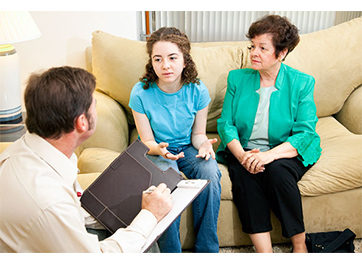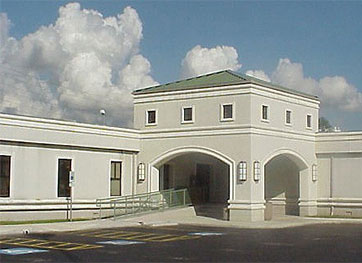
A new clinical research center at UH assesses and treats adolescents who struggle with emotional and relationship difficulties.

The UH-ADAPT Center is located in the Psychology Research and Services Center at Entrance 8 off Cullen Boulevard.
“Adolescence is one of the two major transitional periods in childhood, where we see the most change in terms of biology and social functioning,” said clinical psychologist Carla Sharp. “The hormonal changes are accompanied by changes in both gray and white matter development in the brain. This is in parallel with something called social reorientation, where teens’ primary attachment expands from their parents more toward peers and romantic relationships. But since teens don’t sever ties completely with parents, a tension often emerges between teens seeking autonomy while still being dependent on their parents. This is when relationship issues can emerge for teens and their families.”
A new clinic at the University of Houston recently opened to address this transitional period, as it relates to family relationships. Under the direction of Sharp, who is both a researcher and professor in the Department of Psychology, the Adolescent Diagnosis, Assessment, Prevention, and Treatment Center (UH-ADAPT) addresses an unmet need in Houston. Sharp says there are not enough adolescent services available, and the ones that are often aren’t affordable or accessible. She and her team are working to address this issue. UH-ADAPT is a low-cost provider, with fees set on a sliding scale based on family income.
The center focuses on assessing and treating adolescents ages 12-17 who struggle with emotional and relationship difficulties. There is also a research component that aims to develop more effective tools to identify areas of difficulty for adolescents, such as trouble with emotional intensity, family relationships, interpersonal relationships and thinking processes, as well as improving treatments for these problems.
The three types of disorders targeted by the clinic are emotional, behavior and emerging personality disorders. Emotional disorders include things like anxiety and depression, while behavior disorders result in externalizing behaviors, such as acting out, impulsivity and self-harm. Emerging personality disorders are a confluence of the two, manifesting in a severe way, with one of the quintessential personality disorders being borderline personality disorder (BPD). Sharp’s lab is known internationally as having a great deal of expertise with BPD, which is at the severe end of the continuum.
“We provide services on a sliding scale, since we’re a university clinic and have students in training doing much of the treatment under supervision. That means we can provide services to an underserved population who are falling through the cracks right now,” Sharp said. “Studies have shown the onset for most psychiatric disorders is in adolescence, so it’s this vulnerability period where we need systems in place to catch these kids. They are falling through the cracks partly because there are very little outpatient opportunities for emerging personality disorders, and the outpatient opportunities that exist are cost prohibitive, so we want to address that gap in the market for mental health services in Houston.”
One of Sharp’s goals with this clinic is to help adolescents build a stronger sense of “self” that will ultimately help patients be stronger when life throws something at them.
“Adolescence is a time of identity formation where, for the first time, teens possess the cognitive skills to start putting together their identity,” Sharp said. “To be there when kids are building themselves from the bottom up is a real privilege. We can help them tweak that picture of who they are, which will then help them later on in life to be able to withstand adversities and have that resilience to not fall apart when things get tough.”
She uses the movie “Inside Out” as an example to illustrate how personalities are built. She says each new experience builds a new structure and becomes part of who you are, but when stress happens, those structures are threatened and get colored by emotions. If it’s something really sad, the teen could build a whole sad structure, but if a counselor can help modify this, a different structure can be built. She says that’s where their clinic comes in.
“We see it as a window of opportunity to catch a teen and not let them fall, because once they fall, you have a whole bunch of problems on your hands, such as addiction,” Sharp said. “Adolescents’ brains enjoy pleasure and risk more, so if there’s not a net to catch them as they go through this stressful period, they may fall and then you have extra problems by 15 and 16 that you didn’t even think of when they were 11.”
Sharp says UH-ADAPT will be seeing a broad spectrum of adolescents, offering them three types of services. Clients will be offered comprehensive assessments, individual therapy and group therapy.
The one-day diagnostic/relational assessments will give adolescents and their families a comprehensive, integrated psychological report that covers such things as cognitive functioning, symptoms, family functioning and the teen’s aspect of resilience that gauges how good they are at emotion regulations and social relationships. This written report will not only help the parent understand what’s going on, but also can be given to other mental health providers for further treatment. The individual therapy comes with a mini standardized assessment to help families make decisions of what to do next. The treatment for each adolescent is specifically tailored to their individual needs and strengths. The group therapy, which is planned to start in March, focuses on gaining a better understanding of difficulties with emotional intensity, as well as developing skills to better manage strong emotions. Sessions last 90 minutes, with 5-10 participants, over the course of 18 weeks. Parents are encouraged to participate in a parent-focused group that runs at the same time to help them gain insight into the therapy their children are receiving.
For more information about this clinical research center, visit http://www.uh.edu/class/adapt or contact Amanda Palo, the associate director of UH-ADAPT, at adapt@times.uh.edu or 713-743-0950.
###
About the University of Houston
The University of Houston is a Carnegie-designated Tier One public research university recognized by The Princeton Review as one of the nation’s best colleges for undergraduate education. UH serves the globally competitive Houston and Gulf Coast Region by providing world-class faculty, experiential learning and strategic industry partnerships. Located in the nation’s fourth-largest city, UH serves more than 42,700 students in the most ethnically and culturally diverse region in the country. For more information about UH, visit the university’s newsroom.
For additional news alerts about UH, follow us on Facebook and Twitter.